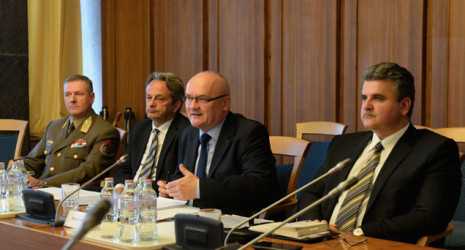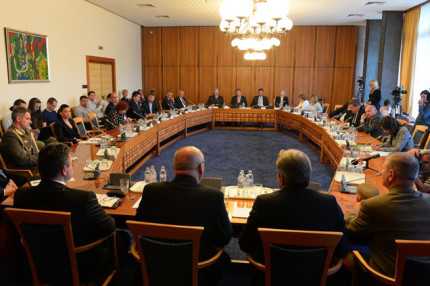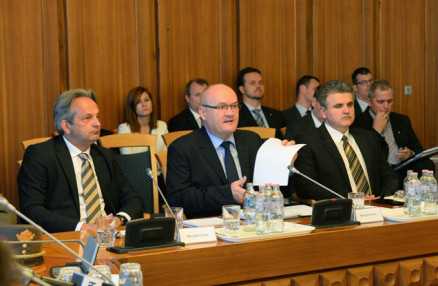Special Committees Support Csaba Hende’s Appointment as Minister
Szöveg: Ádám Draveczki-Ury | 2014. június 6. 12:12“The creation of 21st-century, modern, well-equipped armed forces in the spirit of all-national consensus will be continued in the next term of government”, Csaba Hende told at the joint session of the Parliament’s National Defence and Law Enforcement Committee and National Security Committee on June 4.
“Three thirds"
“The Hungarian Defence Forces are a national institution, their mission is the service of the whole nation", Csaba Hende stated. As he said, accordingly, he takes it for granted that he has the task of representing the “three thirds" in all issues belonging to the scope of the portfolio. “There is no place for any form of party policy in the Hungarian Defence Forces, and in my capacity as Minister, I have never tolerated it, neither for, nor against, since this is the only way to make the armed forces a truly national institution", he added. In this spirit, wherever it is possible, the goal is to reach five-party consensus, and even where it is impossible, all decisions will be taken in the interest of the whole nation too. “Using the means made available to them by Parliament, our soldiers can defend the country. Please, continue to help their efforts in the future too", he said.

The Minister pointed out that, as more and more people have realized in the wake of the Ukrainian crisis, security is not to be taken for granted, and is not permanent either. “There is no prosperity absent security, but we must invent in our security", he said, quoting his US counterpart Chuck Hagel.
A sovereign Hungary requires strong Hungarian Defence Forces; at the same time, security is collective within NATO, and Hungary must contribute its efforts to it.
Csaba Hende reminded his audience that at the present moment too, more than 1,000 Hungarian soldiers are standing by so that they can effectively respond to and provide help with any contingencies and unforeseeable challenges to our security in any part of the country. Among other things, he mentioned the continuous, professional service of the Gripen pilots, the air search and rescue (SAR) service and the EOD technicians, making special mention of the soldiers’ dedicated work during the red sludge disaster and the floods in recent years. The Minister thanked all servicemembers for their efforts made in the interest of regaining and strengthening public trust in the Hungarian Defence Forces.
21st century, modern, well-equipped armed forces
Speaking about the results of the work done in the last four years, the Minister highlighted that they have managed to eliminate corruption, squandering and outsourcing, and to renew the legislative context. In consequence of the changes, a rational, NATO-compatible organization has been born, which is now working more effectively and economically. They have reversed the loss of capabilities, and started to strengthen the Hungarian Defence Forces. Last year, the recently created Volunteer Reserve System passed the test with flying colors as an actual military capability under real-world conditions, when the flooding on River Danube reached an all-time high crest while more than 1400 volunteers were working on the dykes.
Csaba Hende pointed out that the Gripen contract has been renegotiated, and that one month ago the Cabinet decided to allocate an additional resource of around HUF 3 billion. With this, the aircraft will come to have air-to-ground strike capability.

Speaking about the tasks for the term between 2014 and 2018, Csaba Hende reminded his audience that NATO has fully approved the ten-year development plan of the Hungarian Defence Forces, and that the progress of the steps contained in this plan will be determined by the allocation of resources. The basis for this concept is provided by the resource forecasting of the government, which says that the defence budget would not be reduced but rather kept level until 2016, and that from 2016 on, it would increase by 0.1 per cent of the GDP per year. “We will still have things to do and development tasks in 2022 too, but by then we will have had the key capabilities of our 21st-century, modern and well-equipped armed forces", Csaba Hende concluded. He drew attention to the fact that the government had given this guarantee in 2012, and that since then, it has exceeded this target every year by allocating extra resources to various tasks.
Speaking about international engagement, Minister Hende highlighted Hungary’s role in the peacekeeping process in the Western Balkans, the four-month Baltic Air Policing mission which is due in 2015, our joining the air policing mission in Slovenia this year, and the establishment of a V4 EU Battle Group. In parallel with these, NATO will complete its withdrawal from Afghanistan until the end of 2016.
Csaba Hende identified an important objective by pointing to the development of the Volunteer Reserve System, which is open to everyone, and also to the further strengthening of patriotic education, among others with the help of the “Honvédelmi Kötelék" (National Defence Unit) and the “KatonaSuli" (Military School) programs. In the framework of the latter, more than 10,000 secondary school students have already taken the subject “military basics", and many have passed GCSE in this subject as well. The Ministry of Defence and the Hungarian Defence Forces will also pay special attention to the series of commemorations in the centenary year of the outbreak of the First World War, war grave care and public education in military history.
“I have always stood up for the soldiers and will continue to do so"
Following his presentation, in answering an MP’s question, Csaba Hende said that there had been more than 3,000 unfilled positions in the military in 2010. This figure currently stands at 5,921, but since then, 5,196 reservists have joined the system, which started virtually from zero, as back in 2010, the year of the change of government, the Ministry had merely 17 letters of intent from reservists, without any actual capability existing.
In answering another question, the Minister said that currently 8,115 women are serving with the armed forces.
Csaba Hende said he thought it was neither a mistake nor a drawback that staff numbers had increased with the Military Hospital becoming an element in the Table of Establishment (TOE). The changes made here all have contributed to the consolidation and increasing efficiency of the hospital, and it is doctors and nurses that account for most of the relevant staff numbers.
In answering another question, Csaba Hende said that the introduction of the HDF career path model is to be expected to take place during the next term of government, but certain elements of it are already in place. In parallel with this, the officer and NCO training has been provided new foundations in the last four years, and with the establishment of the National University of Public Service, fundamental steps have been taken towards creating a uniform public service career path model and the permeability of career paths.
Speaking about the soldiers’ pay raise, he noted that thanks to the government, as an above-budget allocation, the NCOs and enlisted personnel would receive a monthly supplement of HUF 10,000 as long as there are no additional benefits. “I have always stood up for the soldiers, and will continue to do so", the Minister said.

In answering questions from committee members concerning capability developments, Csaba Hende said that currently there is intensive work in progress to settle the issues of fixed-wing aircraft and helicopter capabilities, and hopefully, both issued would be settled in this year.
The Minister stated that they are not considering to reintroduce conscription, and the idea of it has not emerged at all.
The level of ambition concerning troops on foreign missions continues is still 1,000 personnel; currently around 700 Hungarian soldiers are serving in twelve countries on three continents.
In reacting to a proposal, Csaba Hende pointed out that the merger of military intelligence services has resulted in significant savings, and that the newly constituted Military National Security Service has considerable merits.
This was confirmed by Zsolt Molnár, the chairman of the National Security Committee, who praised the activity of the service in connection with the events in Ukraine.
After the hearing, the National Defence and Law Enforcement Committee supported the new appointment of Csaba Hende as Minister with six votes in favor and two against, while the National Security Committee followed suit with four votes in favor, one against, and one abstention.
Photo: Mária Krasznai-Nehrebeczky